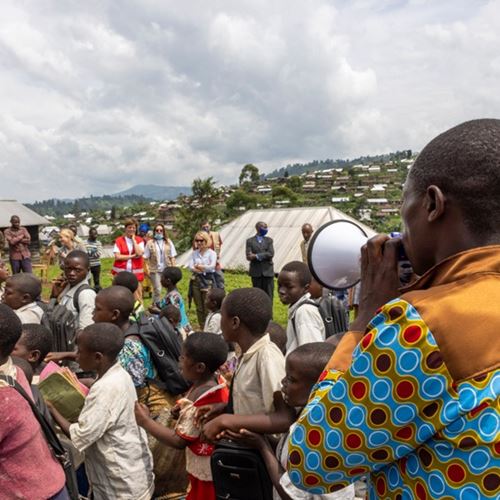With nearly 5.4 million Internally Displaced Persons (IDPs), DR Congo is home to one of the world's largest IDP populations. As needs soar, the Secretary-General of the Danish Refugee Crisis (DRC) visited the North Kivu province to take stock of the situation.
“We are confronted with a situation of 27 million people in need in the country - largely because of accrued violence in the Eastern provinces and high levels of food insecurity in the country. This includes the provinces of North Kivu and Ituri in the East where violence rages and requires special attention from the international community,” says DRC Secretary-General, Charlotte Slente.
“As the recorded numbers of human rights violations and deadly attacks perpetrated by armed groups continue to rise, thousands of people are forced into displacement, and the number is likely to increase in the coming months,” she says.
The levels of insecurity are such that the delivery of humanitarian assistance to people of concern are compromised. Beyond physical safety, the presence of armed groups constitutes a severe threat to people of concern’s mental health, livelihoods, food security and education, all with long-term consequences.
“While the severity of the crisis in Ituri and North Kivu calls for urgent attention, solutions do exist and need to be scaled up. We must do so by responding to immediate needs, but also by paving the way for self-reliance and durable solutions,” says Charlotte Slente.
“The Congolese government and the international community must boost the humanitarian response and push the agenda of peace-building further. We call on all actors to have zero tolerance for hate speech, violence against civilians, including against humanitarian workers,” she says.
The Secretary-General points at the triple humanitarian-development-peacebuilding Nexus approach, which has proven efficient in addressing conflict. In Eastern DR Congo, conflict is the root cause of 98 percent of internal displacement.
The Secretary-General visited a project in Birambizo, where DRC and Concern Worldwide jointly implement the AFTER project. This 3-year project aims at bridging the gap between emergency and development interventions and pave the way for recovery after shocks by combining protection, education, livelihood and WASH activities.
DRC is one of the leading agencies implementing emergency and recovery activities for communities affected by displacement in Eastern DR Congo. The Secretary-General visited activities and met key stakeholders in order to discuss how to best respond to the current crisis and put it on the international agenda.
